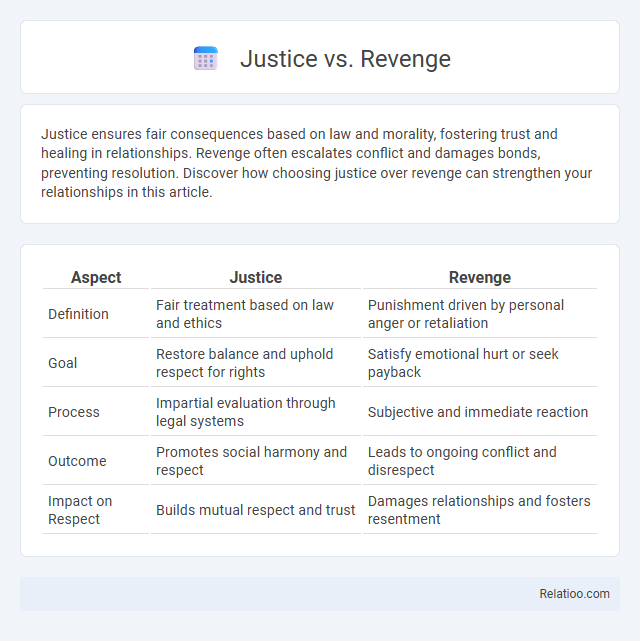Justice ensures fair consequences based on law and morality, fostering trust and healing in relationships. Revenge often escalates conflict and damages bonds, preventing resolution. Discover how choosing justice over revenge can strengthen your relationships in this article.
Table of Comparison
| Aspect | Justice | Revenge |
|---|---|---|
| Definition | Fair treatment based on law and ethics | Punishment driven by personal anger or retaliation |
| Goal | Restore balance and uphold respect for rights | Satisfy emotional hurt or seek payback |
| Process | Impartial evaluation through legal systems | Subjective and immediate reaction |
| Outcome | Promotes social harmony and respect | Leads to ongoing conflict and disrespect |
| Impact on Respect | Builds mutual respect and trust | Damages relationships and fosters resentment |
Understanding the Concepts: Justice and Revenge
Justice embodies fairness and impartiality, ensuring that consequences align with laws and ethical standards, while revenge is driven by personal anger and desire for retaliation, often bypassing legal frameworks. Understanding justice involves recognizing its role in maintaining social order and protecting rights, whereas revenge prioritizes emotional satisfaction and can perpetuate cycles of conflict. Distinguishing these concepts is crucial for fostering societal harmony and individual accountability.
Historical Perspectives on Justice and Revenge
Historical perspectives on justice and revenge reveal distinct societal approaches to conflict resolution, with justice emphasizing collective legal systems and revenge rooted in personal or familial retaliation. Ancient societies, such as those in Mesopotamia and Greece, often transitioned from revenge-based customs to codified laws like Hammurabi's Code and Athenian courts, reflecting evolving concepts of fairness and order. Your understanding of these shifts underscores how justice serves to maintain social cohesion by replacing cycles of vengeance with standardized penalties.
Key Differences Between Justice and Revenge
Justice ensures fair treatment based on laws and ethical standards, promoting societal order and accountability, while revenge is driven by personal emotions and aims to inflict harm or suffering in response to wrongdoing. Your pursuit of justice seeks balanced resolution through impartial judgment, whereas revenge often perpetuates conflict and escalates negativity. Understanding these key differences helps you choose constructive actions that support long-term peace over destructive retaliation.
Motivations Behind Seeking Justice vs. Revenge
Justice is driven by a desire to uphold fairness and restore balance within a legal or moral framework, ensuring accountability without personal bias, while revenge is fueled by personal pain and the urge to retaliate against perceived wrongs, often escalating conflict. Seeking justice involves objective evaluation and aims to protect societal order, whereas revenge prioritizes emotional satisfaction and retribution, risking perpetuation of harm. Understanding your motivations can help distinguish whether your actions serve a greater good or personal vendetta, impacting outcomes for both individuals and communities.
The Role of Emotions in Justice and Revenge
Justice emphasizes impartiality and adherence to legal standards, aiming to restore societal balance by addressing wrongdoing through fair processes. Revenge is driven primarily by emotions such as anger and a desire for personal retribution, often resulting in subjective and disproportionate responses. Emotions play a critical role in motivating revenge, while justice seeks to regulate emotional impulses to ensure decisions are based on evidence and equity.
Societal Impact of Justice and Revenge
Justice fosters societal stability by upholding laws that protect individual rights and promote fairness, creating an environment where trust in institutions flourishes. Revenge often incites cycles of violence and retaliation, undermining social cohesion and perpetuating conflict within communities. Your support for justice over revenge contributes to a more peaceful society focused on rehabilitation and equitable resolution.
Legal Systems: Promoting Justice, Preventing Revenge
Legal systems prioritize the promotion of justice by ensuring fair trials, impartial judgment, and consistent application of laws to resolve disputes objectively. These frameworks are designed to prevent revenge by channeling grievances through formal mechanisms, reducing cycles of retaliation and violence. Emphasizing restitution and rehabilitation over punishment helps maintain social order and uphold the rule of law.
Psychological Effects of Choosing Revenge over Justice
Choosing revenge over justice often leads to prolonged feelings of anger, bitterness, and psychological distress as individuals become trapped in cycles of resentment. This vengeful mindset can inhibit emotional healing and foster anxiety, depression, and impaired social functioning. Studies in forensic psychology highlight that revenge rarely provides closure, undermining mental health, whereas justice promotes resolution and emotional restoration.
Case Studies: Justice vs. Revenge in Action
Case studies of justice versus revenge reveal how judicial systems prioritize fairness and rule of law over personal retaliation to maintain social order. Your understanding deepens when examining landmark cases like the O.J. Simpson trial, where legal proceedings emphasized due process rather than vigilante justice. These examples highlight the crucial role of institutional justice in resolving conflicts and preventing cycles of revenge.
Pathways to Healing: Embracing Justice Over Revenge
Choosing justice over revenge creates a pathway to healing by promoting fairness and accountability without perpetuating harm or bitterness. Embracing justice allows you to restore balance and dignity, fostering emotional recovery instead of fueling ongoing conflict. Prioritizing restorative justice methods supports long-term healing for both victims and communities, breaking cycles of pain through structured resolution.

Infographic: Justice vs Revenge
 relatioo.com
relatioo.com